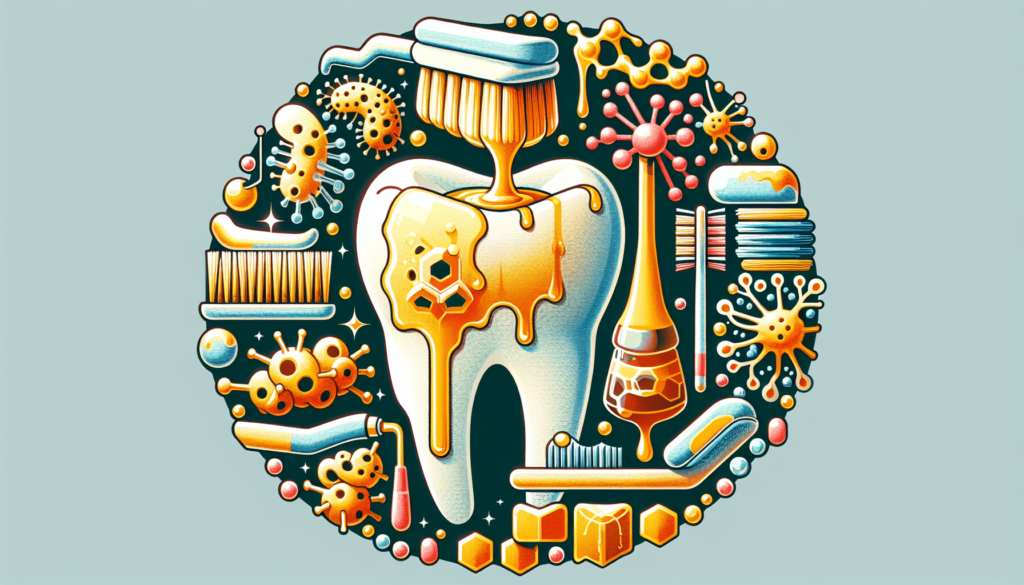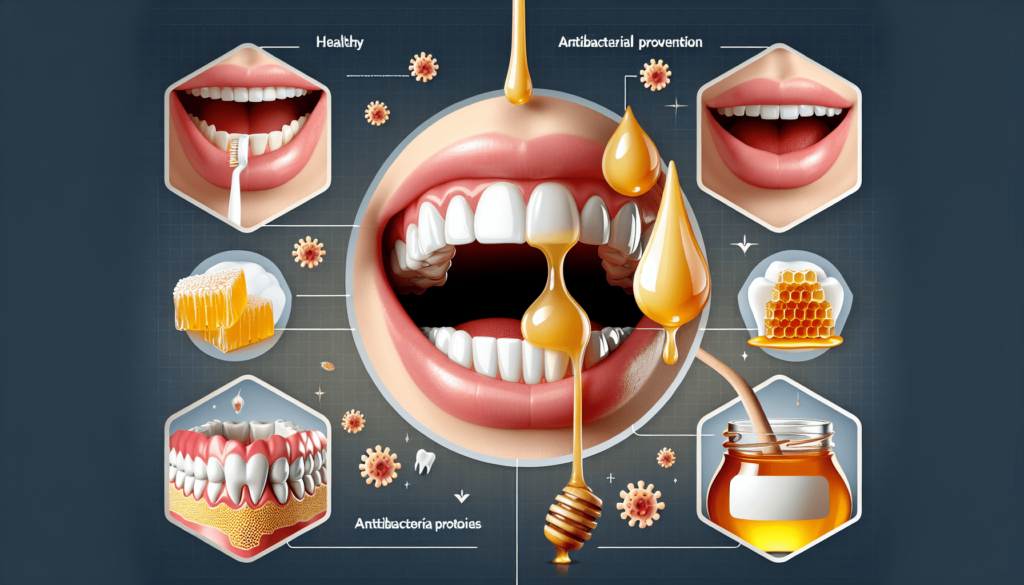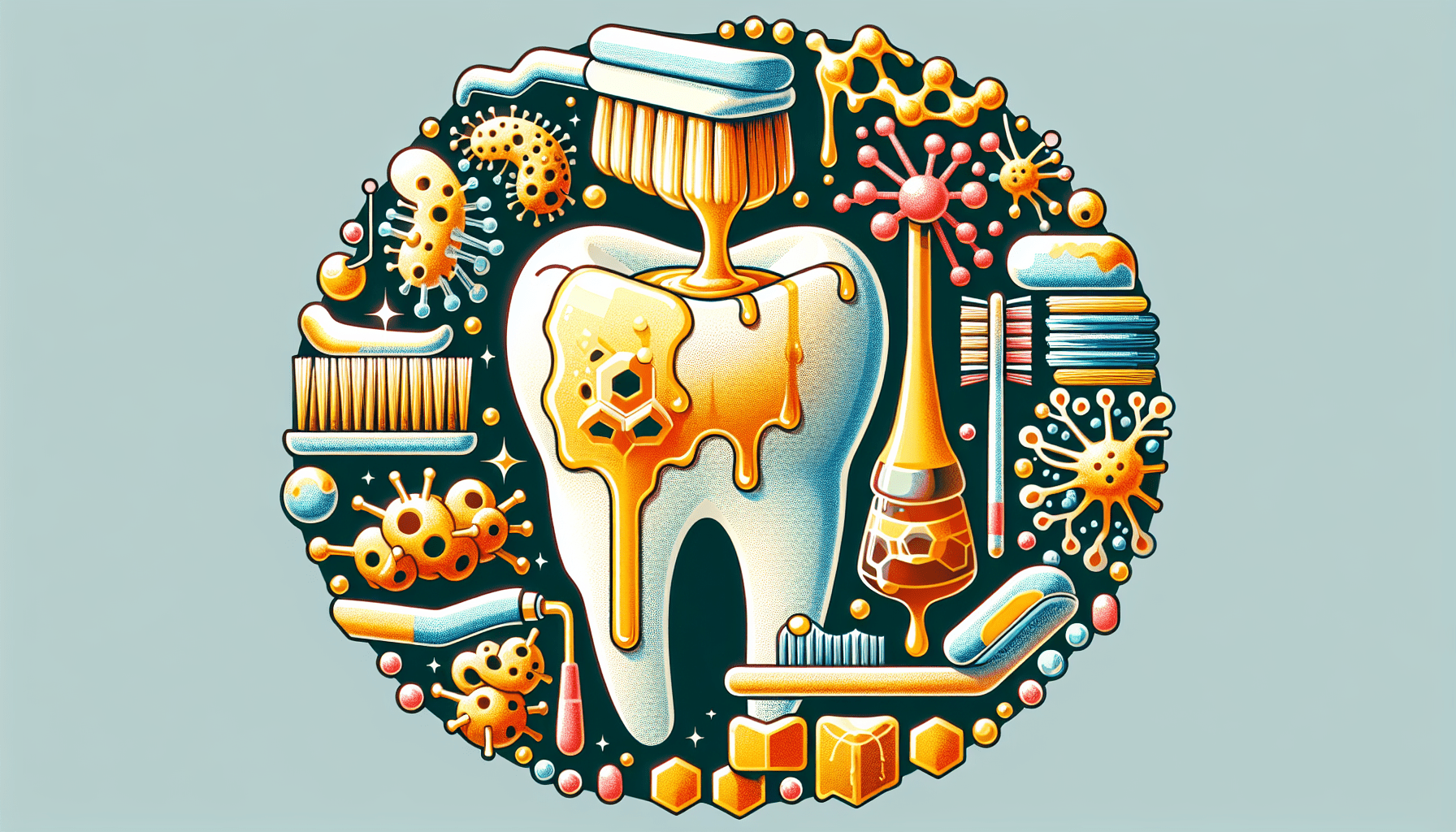Imagine a sweet, golden elixir that not only satisfies your taste buds but also works wonders for your oral health. That’s right, we’re talking about honey! In this article, we will explore the amazing ways in which honey contributes to oral health and cavity prevention. From its natural antibacterial properties to its ability to soothe inflammation, you’ll be amazed at the many benefits honey can offer for a healthier smile. So, sit back, relax, and discover the secrets behind this sticky, yet marvelous, natural remedy for your teeth and gums.

Antibacterial Properties of Honey
Honey is renowned for its antibacterial properties, making it an excellent natural remedy for maintaining oral health. One of the main reasons behind honey’s ability to fight bacteria is the presence of hydrogen peroxide. This compound is produced by the enzymatic action of glucose oxidase, an enzyme naturally present in honey. When exposed to moisture, glucose oxidase breaks down glucose and releases hydrogen peroxide, which acts as a potent antibacterial agent.
In addition to hydrogen peroxide, honey contains a variety of other antibacterial compounds. These compounds, such as phenols, flavonoids, and organic acids, work synergistically to combat harmful bacteria and prevent infection. The unique combination of these compounds gives honey its broad-spectrum antimicrobial properties, making it effective against various strains of bacteria.
The antibacterial properties of honey play a crucial role in maintaining oral health. By inhibiting the growth of bacteria, honey helps prevent plaque formation and reduces the risk of gum diseases and tooth decay.
Prevents Plaque Formation
Plaque, a sticky film consisting of bacteria and their byproducts, is a common oral health concern. Honey proves to be an effective ally in preventing plaque formation. The antibacterial compounds present in honey inhibit the growth of bacteria responsible for plaque formation. Additionally, honey can reduce the adhesion of bacteria to the tooth surface, making it harder for them to colonize and form plaque.
Not only does honey prevent plaque formation, but it also helps prevent the formation of biofilms. Biofilms are highly organized communities of bacteria enclosed in a protective matrix. They are known to contribute to the development of dental caries and gum diseases. However, the antibacterial properties of honey disrupt the biofilm formation process, thereby reducing the risk of oral health issues.
Promotes Saliva Production
Honey has the power to stimulate saliva flow, which is essential for maintaining optimal oral health. Saliva acts as a natural defense mechanism against cavity formation. It helps flush away food particles and neutralize the acids produced by bacteria, thereby minimizing the risk of tooth decay.
Saliva also contains important components, such as enzymes and antimicrobial proteins, that aid in oral health. By enhancing saliva production, honey supports the natural defense mechanisms of the oral cavity, creating a healthier environment.

Potential Anti-inflammatory Effects
In addition to its antibacterial properties, honey also possesses potential anti-inflammatory effects in the oral cavity. Inflammation is a common response to gum diseases and oral infections. Honey’s anti-inflammatory properties can help reduce the swelling and discomfort associated with these conditions.
Furthermore, honey’s anti-inflammatory effects can alleviate gum diseases such as gingivitis and periodontitis. These conditions are characterized by inflammation of the gums, which can lead to gum recession and tooth loss if left untreated. Honey’s ability to mitigate inflammation can contribute to the overall health of the gums and help prevent further complications.
Rich in Antioxidants
One of the lesser-known benefits of honey for oral health is its rich antioxidant content. Antioxidants are compounds that protect the body’s cells from oxidative damage caused by free radicals. In the oral cavity, oxidative stress can lead to tissue damage and contribute to oral diseases.
Honey contains various types of antioxidants, such as polyphenols and flavonoids, which play a crucial role in neutralizing free radicals. By neutralizing these harmful molecules, honey helps protect the oral tissues from oxidative damage, promoting overall oral health.
Enzymes and Amino Acids in Honey
Honey is not just a sweet indulgence; it is also a source of beneficial enzymes and amino acids that contribute to oral health. Hydrolytic enzymes, such as amylase and invertase, are naturally present in honey and aid in the breakdown of complex carbohydrates, promoting better digestion and preventing the accumulation of food debris in the mouth.
Moreover, honey contains various amino acids, including proline and lysine. These amino acids support tissue repair and regeneration, playing a vital role in maintaining healthy gums and preventing oral infections.
Remineralization of Teeth
Tooth enamel, the protective outer layer of the teeth, can be susceptible to demineralization caused by acids produced by bacteria. However, honey can assist in the remineralization process, contributing to the strengthening of tooth enamel.
Honey contains natural sources of minerals, such as calcium and phosphorus, that are essential for healthy teeth. When consumed regularly, honey provides these minerals to the teeth, aiding in the remineralization process and maintaining strong and cavity-resistant enamel.
Low pH and Acidic Environment
The acidity of the oral environment plays a significant role in the development of oral health issues. Honey, with its low pH level, creates an unfavorable environment for the growth of acid-producing bacteria. These bacteria can erode tooth enamel and contribute to the formation of cavities.
By inhibiting the growth of acid-producing bacteria, honey helps protect against demineralization and reduces the risk of tooth decay. Its low pH level also helps maintain a balanced oral environment, promoting better overall oral health.
Potential Role in Wound Healing
Honey has long been used for its healing properties, and its potential in promoting wound healing extends to oral wounds and gum injuries. The antibacterial and anti-inflammatory properties of honey can aid in the healing process, reducing the risk of infection and promoting faster recovery.
Oral wounds, such as mouth ulcers and surgical incisions, can be painful and debilitating. By applying honey to these wounds, you can harness its healing properties and promote oral health. However, it is important to consult with a healthcare professional before using honey for oral wound care.
Considerations and Precautions
While honey offers numerous benefits for oral health, it is essential to be aware of its limitations and potential side effects. Some individuals may be allergic to honey or may experience adverse reactions, such as allergic rhinitis or contact dermatitis. It is important to exercise caution when using honey, especially if you have known allergies.
Additionally, honey is high in sugar content, which can affect blood sugar levels, especially in individuals with diabetes. It is important to consume honey in moderation and incorporate it into a well-balanced diet.
Furthermore, excessive consumption of honey can increase the risk of dental caries. The sugars in honey can provide a food source for bacteria, leading to the production of acids that can erode tooth enamel. Maintaining proper oral hygiene practices, such as regular brushing and flossing, is crucial to minimize the potential negative effects of honey on dental health.
In conclusion, honey possesses remarkable antibacterial properties along with a myriad of other benefits for oral health. From preventing plaque formation to promoting saliva production, honey contributes significantly to maintaining optimal oral health. However, it is important to understand the limitations, exercise moderation, and practice good oral hygiene when incorporating honey into your oral care routine. By harnessing the natural power of honey, you can enhance your oral health and enjoy a healthy, vibrant smile.

